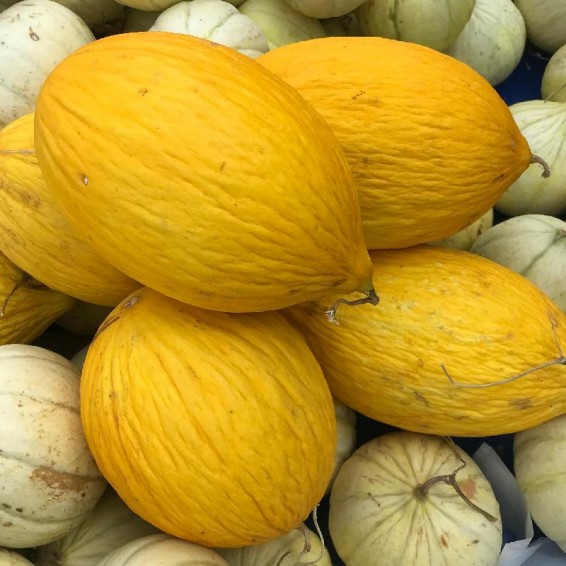Organic Crenshaw Melon Seeds
- HOW TO GROW
- FAST FACTS
- REVIEWS
HOW TO GROW
Sowing: Melons must not be planted until the soil temperature has warmed to 70-80 degrees F, since they thrive in heat. Start the plants indoors only 2-4 weeks before transplanting, since if the plants grow too large they have difficulty adjusting to the change. Sow several seeds 1/2" deep in each peat pot, and keep them at 75 degrees until they germinate. Thin to the strongest plant in each pot by cutting off the others. Gradually accustom the plants to outdoor temperatures by setting them outside during the day, then transplant them to hills 4-6' apart with 2-3 plants to a hill. For companion planting benefits, plant melons near corn but not potatoes.
Growing: In cooler climates, melons may benefit from black plastic to warm the soil; Crenshaw melons especially love heat. Mulch helps to conserve necessary moisture, control weeds, and keep the melons clean. Adequate moisture is particularly crucial as the vines begin to develop. After midsummer, pinch off blossoms and smaller fruits in order to direct the full energy to the larger fruits; the smaller fruits will not have time to ripen before frost, and are no great loss.
Harvesting: As the melon ripens, it will turn yellowish green and become very fragrant; the stem should fall off easily, and the blossom end should be slightly soft. The melon will keep for several weeks in a cool place.
Seed Saving: When saving seed from melons, keep in mind that they will cross pollinate with other varieties of melon but not with watermelon, cucumbers, or squash. Melon seeds mature when the fruit is ripe; cut open the fruit and put the pulp that contains the seeds into a bowl. Work it with your fingers to separate the seeds from the pulpy fibers. Add enough water so that the pulp and the hollow seeds will float; remove the floating material, and the good seeds will remain at the bottom of the bowl. Rinse them well, then spread them out to dry completely. Store them in a cool, dry place for up to five years.
FAST FACTS
Latin Name: Cucumis melo
Type: Open Pollinated, Heirloom, Warm Season
USDA Zones: 3, 4, 5, 6, 7, 8, 9, 10, 11, 12
Seeds per Ounce: 750
Planting Method: Direct Sow
Sunlight: Full Sun
Height: 16 Inches
Color: Orange
Quality Seeds
Very Good quality Seeds and very Fast shipment
DESCRIPTION
HOW TO GROW
Sowing: Melons must not be planted until the soil temperature has warmed to 70-80 degrees F, since they thrive in heat. Start the plants indoors only 2-4 weeks before transplanting, since if the plants grow too large they have difficulty adjusting to the change. Sow several seeds 1/2" deep in each peat pot, and keep them at 75 degrees until they germinate. Thin to the strongest plant in each pot by cutting off the others. Gradually accustom the plants to outdoor temperatures by setting them outside during the day, then transplant them to hills 4-6' apart with 2-3 plants to a hill. For companion planting benefits, plant melons near corn but not potatoes.
Growing: In cooler climates, melons may benefit from black plastic to warm the soil; Crenshaw melons especially love heat. Mulch helps to conserve necessary moisture, control weeds, and keep the melons clean. Adequate moisture is particularly crucial as the vines begin to develop. After midsummer, pinch off blossoms and smaller fruits in order to direct the full energy to the larger fruits; the smaller fruits will not have time to ripen before frost, and are no great loss.
Harvesting: As the melon ripens, it will turn yellowish green and become very fragrant; the stem should fall off easily, and the blossom end should be slightly soft. The melon will keep for several weeks in a cool place.
Seed Saving: When saving seed from melons, keep in mind that they will cross pollinate with other varieties of melon but not with watermelon, cucumbers, or squash. Melon seeds mature when the fruit is ripe; cut open the fruit and put the pulp that contains the seeds into a bowl. Work it with your fingers to separate the seeds from the pulpy fibers. Add enough water so that the pulp and the hollow seeds will float; remove the floating material, and the good seeds will remain at the bottom of the bowl. Rinse them well, then spread them out to dry completely. Store them in a cool, dry place for up to five years.
FAST FACTS
Latin Name: Cucumis melo
Type: Open Pollinated, Heirloom, Warm Season
USDA Zones: 3, 4, 5, 6, 7, 8, 9, 10, 11, 12
Seeds per Ounce: 750
Planting Method: Direct Sow
Sunlight: Full Sun
Height: 16 Inches
Color: Orange
Reviews
Review
Quality Seeds
Very Good quality Seeds and very Fast shipment





